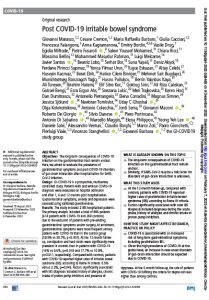Post COVID-19 irritable bowel syndrome
ABSTRACT

Objectives:
The long-term consequences of COVID-19 infection on the gastrointestinal tract remain unclear. Here, we aimed to evaluate the prevalence of gastrointestinal symptoms and post-COVID-19 disorders of gut–brain interaction after hospitalisation for SARS-CoV-2 infection.
Design:
GI-COVID-19 is a prospective, multicentre, controlled study. Patients with and without COVID-19 diagnosis were evaluated on hospital admission and after 1, 6 and 12 months post hospitalisation. Gastrointestinal symptoms, anxiety and depression were assessed using validated questionnaires.
Results:
The study included 2183 hospitalised patients. The primary analysis included a total of 883 patients (614 patients with COVID-19 and 269 controls) due to the exclusion of patients with pre-existing gastrointestinal symptoms and/or surgery. At enrollment, gastrointestinal symptoms were more frequent among patients with COVID-19 than in the control group (59.3% vs 39.7%, p<0.001). At the 12-month follow-up, constipation and hard stools were significantly more prevalent in controls than in patients with COVID-19 (16% vs 9.6%, p=0.019 and 17.7% vs 10.9%, p=0.011, respectively). Compared with controls, patients with COVID-19 reported higher rates of irritable bowel syndrome (IBS) according to Rome IV criteria: 0.5% versus 3.2%, p=0.045. Factors significantly associated with IBS diagnosis included history of allergies, chronic intake of proton pump inhibitors and presence of dyspnoea. At the 6-month follow-up, the rate of patients with COVID-19 fulfilling the criteria for depression was higher than among controls.
Conclusion:
Compared with controls, hospitalised patients with COVID-19 had fewer problems of constipation and hard stools at 12 months after acute infection. Patients with COVID-19 had significantly higher rates of IBS than controls.
Trial registration number NCT04691895.
Download Publication
Correspondence to Dr Giovanni Barbara, Azienda Ospedaliero-Universitaria di Bologna IRCCS, Bologna, Emilia-Romagna, Italy; giovanni.barbara@unibo.it
Received 15 August 2022 Accepted 23 November 2022 Published Online First 9 December 2022
Marasco G, et al. Gut 2023;72:484–492. doi:10.1136/gutjnl-2022-328483
Gut: first published as 10.1136/gutjnl-2022-328483 on 9 December 2022.
Downloaded from http://gut.bmj.com/ on February 7, 2023 at Azienda Ospedaliero-Universitariapoliclinicos. Orsola Malpighi.
Protected by copyright.
Read the full publication with supporting tables and figures

